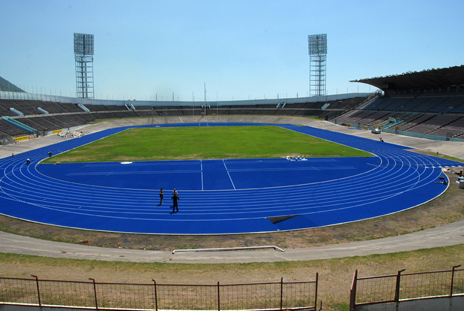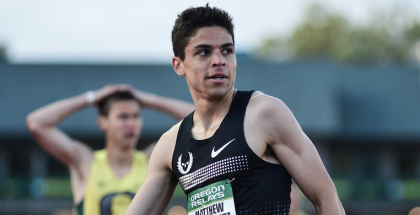Hall retires, Felix double activated and what the hell happened with the WADA report? The Monday Morning Run....
Kevin Sully | On 19, Jan 2016
Ryan Hall’s retirement and the release of WADA’s second independent commission report split the headlines last week, at least in the United States. Plenty on both below, but first…….the return of The Medalists–my top three performances of the week. It’s still early on in the year so the term “performance” is used loosely in some cases. Nonetheless, it feels good to be back writing about actual marks now that we are in the Clean Athletics Era!
The Medalists
Gold: Jenn Suhr
A world record attempt in the second week of January at a small indoor meet in Ohio? A world record attempt in the second week of January at a small indoor meet in Ohio!!
5.03 WR. Oh so close…!! Just missed it, should have made it. Not satisfied with today’s result 4.91m. #PoleVault pic.twitter.com/suoDtuPcmC
— Jenn Suhr (@JennSuhr) January 16, 2016
Silver: Luke Puskedra
Puskedra finished fourth in the Houston Half Marathon running 1:01:29. No doubt this result will make him a popular pick to make the Olympic team in the marathon next month. He is young, proven at the full distance and is currently in very good shape. Not many others running the Trials can claim all three.
Bronze: Allyson Felix
The IAAF/IOC changed the schedule for the Olympics last week, allowing the possibility for a Felix 200m/400m double. Before you scream preferential treatment, remember the schedule is a living document. This switch no doubt helps her chances, but you could just as easily have said the previous schedule (the one used for the 2015 World Championships) was arbitrarily written to her disadvantage.
Now, if you want to bring up why the Olympics/World Championships don’t have a standardized schedule that remains the same from year to year, I think that is a perfectly valid point. A point that can only be answered by saying that track doesn’t do the easy thing, they do the thing that is overly complicated and will make people really upset.
More on the Felix double from my post a few weeks back.
Ryan Hall Retires
The first time I saw Ryan Hall he was signing autographs. I wasn’t close enough to see if it was an adult or one of his competitors asking for his signature before his race at the Mt. SAC cross country course. I was just impressed that a high school runner had already reached that level of fame. This was the early 2000s. The internet was around to give us race results and the occasional photo, but there was no streaming video or athlete interviews on demand. Footlocker Nationals were shown on tape delay a couple weeks after the race. You didn’t have to try very hard to avoid spoilers.
The people who around Hall that day had probably never heard his voice or seen his stride. But they had, despite the lack of information, heard that he was fast. The articles written about him cast him as a bit of a teenager Thoreau, a boy who lived in a small mountain town and ran around a lake with his father. I don’t recall if he won the race that day. I do remember he was the one runner everyone focused on, before, during and after the meet. That obsession stayed in tact pretty much all the way until Hall retired from running last Friday.
His motivations for why he ran weren’t always the most relatable, the natural result of saying you are being coached by God. But then there were also occasions when he infinitely relatable. He’d go to the front of the field in the Boston Marathon and put his hand to his ear as he ran by Wellesley and you’d imagine that is exactly the thing you’d do if you were that good. The final four years of his career were a struggle. Injuries, coaching changes and an inability to get to the starting line healthy. All of the problems from 2012 gave the impression that he left something on the table. It’s easy to look at his free flowing and constantly evolving approach toward his running and attribute those qualities to the slow down. One year, when he was firmly entrenched as a marathoner, he proclaimed his new goal was to break four minutes in the mile. On another occasion, he said he wasn’t motivated by victory.
All of these statements made for interesting discussion points. They also detracted from the rather normal, physiological reasons why he wasn’t running like he did in his prime. Hall at his best was phenomenal. And he was like that for a very long time.
Starting from 2003, when he finished second in the NCAA Cross Country Championships, and going through the 2012 Olympic Trials he had almost ten years of consistently great racing. In between that time he broke one hour for the half-marathon, qualified for two Olympic teams, had numerous top five finishes in major marathons and played the role of unintentional rabbit to the fastest marathon in history. He ran under 2:10 eight times. If you need any proof of how hard that is do, check the all-time list to see how many Americans are under that mark.
I’m not sure why we expected his career to last forever. I can understand an athlete not recognizing their prime when they’re in the middle of it. That type of delusion is helpful. But everyone on the outside should know that no matter how optimistic an athlete speaks of their training they eventually do slow down. Maybe this is the side effect of competing at the same time as Meb Keflezighi, who completely ruined the curve for everyone else when it comes to longevity. In Hall’s case, because he was so good, the fall was more dramatic. There was no slow decline. I was at the LA Marathon last March, which at the time was the latest in a long line of comeback races. His agent, Josh Cox, was the emcee in the media room and was sunny about Hall’s chances each time he mentioned him. But before the halfway mark, Hall fell back of the leaders and soon dropped out. It was another full turn of the hype/disappointment cycle.
But if you are going to ding him for decision making throughout his career, then you also need to give him credit for one choice he made early in his career. In 2007, at the age of 24, he ran the London Marathon. Not many runners transition to the marathon that young and certainly not Americans who made the World Championship team on the track two years prior. Hall ran 2:08:24 in London and found his distance.
His high school contemporary, Alan Webb, is rightfully credited with kick-starting the middle distance resurgence in the United States. Hall’s career was just as good, but it didn’t have the same effect on his fellow Americans. At least not yet anyway.
Perhaps that speaks to how difficult the marathon is for someone to master. The training, the recovery, the in-race strategy are filled with pitfalls. Despite this, Hall stayed at the top for nine years.
Doping report part two
Surely you’ve read all the news about WADA’s Independent Commission report because you like to torture yourself. We didn’t get the “Putin embroiled in race walking doping ring,” headline we were all hoping for, but the former IAAF President Lamine Diack did name check the Russian President on occasion. My main takeaway was confusion. Dick Pound, the face of the IC, spoke at great length about extortion in the organization as it related to the Russian positive tests. Several times in his report, he mentioned institutional failure and included how it wasn’t possible that the higher level of the organization was unaware that Lamine Diack was extorting athletes.
Apparently, that higher level didn’t include the sitting Vice President.
By the end of the press conference Pound had not only discounted any responsibility that Seb Coe had in the matter, but also endorsed him as the person most qualified to now clean up the mess. In short, the conclusion did not support the evidence that was presented.
The kind words from Pound to Coe distracted from the actual findings in the report, which were remarkable in their own right. The IC found that Diack, his two sons, his lawyer, the head of the anti-doping department, and a few others on occasion, created their own department within the organization that was set-up to handle the Russian doping cases.
That’s when basic economics took over and the laws of supply and demand were too strong to ignore. There was an bountiful supply of Russian positives with which to profit off of and a demand for lots of money from Diack’s group. If you were looking for something redeemable out of this, like maybe Diack created this shadow extortion crew in some twisted way to save the reputation of track and field, then you were disappointed. It was just greed. Surely, track could have absorbed the news of 23 cheaters on the Russian team and been just fine. It wouldn’t exactly have shaken the earth.
The confluence of factors for all this to happen is noteworthy because of it spun good intentions into a rampant money grab. First, you needed a sport that has the desire to find cheaters–enough so that there is a drug testing program in place and a fanbase that wants results. Then, there must be athletes who are willing to break the rules. Obviously, that wasn’t hard to find. Finally, you need a governance structure and culture so weak that a handful of men are allowed to make a cottage industry out of extorting the cheaters.
Like the first report, this paints the IAAF leadership as being worse than inept or disengaged. Lamine Diack’s lawyer, Habib Cisse and Diack’s son, Pappa Massata Diack spent numerous years trying to squeeze everything they could out of marathoner Liliya Shobukhova under the agreement that her positive test would be taken care of. In sum, she paid $669,000 over several payments in order to become eligible for the 2012 Olympics, an entry fee that even a triathlete would considered steep. The result? Shobukhova didn’t finish the race, part of the money was returned and the IAAF ended up sanctioning her anyway in 2014. Talk about a lose-lose-lose-lose situation.
The Diack sons tried the same tactic with Asli Cakir Alptekin, the Turkish woman who won the Olympic 1500m in 2012. It didn’t get as far, but it wasn’t for lack of trying. Pappa Massata Diack requested 650,000 Euros to make the case go away and Khalil Diack (the other son) made numerous to Istanbul in 2014.
It’s hard to look at the report and think that anyone who was part of the administration would keep their jobs. And yet, Pound said Coe is in the correct position to try and fix it. While there are strong arguments that the sport is wholly out of compliance in the eyes of WADA, I don’t there will be any punitive consequences for the sport. The IOC isn’t going to cancel track in Rio Olympics and replace it with a week of silence where the IAAF has to sit in the corner and think about their behavior.
It does make me wonder if federations will start to question why this governing body is representing them. Administrators and bureaucrats are expendable. People pay to watch athletes. The threshold for running a sports league is quite simple. One, make sure the competition is as fair as possible. Two, promote the sport. Three, stay out of the way and don’t screw anything up.
Pound’s argument, the second one anyway, relied on the premise that the organization was so innately dysfunctional that the vice president had no knowledge of Diack’s activities. That may be true (though not if you take Pound’s first argument seriously), but if reform is the goal, why allow that structure to continue?
-
Uhh….Donavan Brazier??? Hellooo?!?!



















Comments